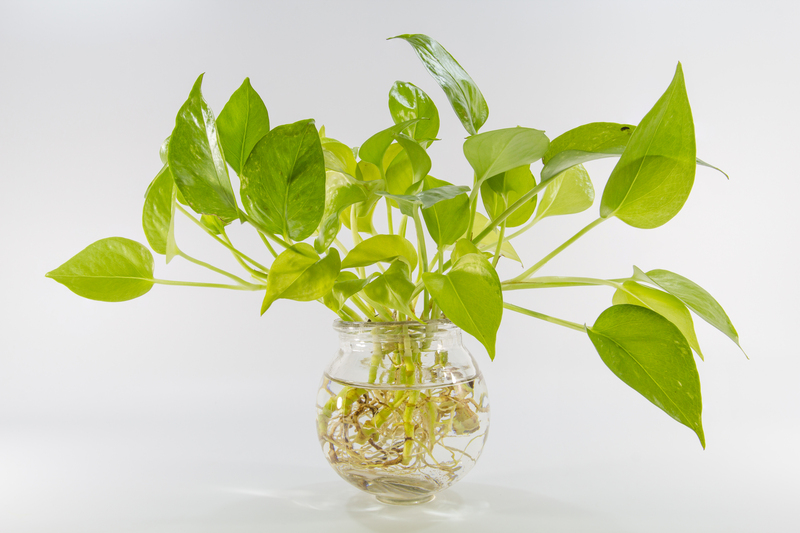Sustainable Soil Solutions with Organic Debris
Posted on 31/05/2025
Sustainable Soil Solutions with Organic Debris: An In-Depth Guide
The health of our planet relies significantly on the condition of our soils. However, with modern agricultural practices, urbanization, and climate change, soil degradation has become a global concern. Fortunately, sustainable soil solutions with organic debris present an effective and eco-friendly way to rejuvenate soils, improve fertility, and foster environmental resilience. In this comprehensive guide, we dive deep into how you can harness the power of organic debris to create healthy, thriving soils.

Why Is Soil Health So Important?
Before delving into the role of organic debris, let's examine why soil health is a critical issue. Healthy soils do more than support plant growth--they sustain biodiversity, filter water, store carbon, and help regulate the Earth's temperature. Yet, unsustainable agricultural techniques, chemical overuse, and erosion are stripping soils of their vitality. Restoring soil health is vital for the environment and for future food security.
- Food Production: Healthy soils yield robust crops and nutritious food.
- Biodiversity: A rich soil ecosystem supports countless microorganisms, insects, and plants.
- Water Management: Quality soils filter rainwater and prevent runoff.
- Carbon Sequestration: Soils trap carbon, helping mitigate global warming.
What Is Organic Debris?
Organic debris refers to natural plant and animal matter that breaks down and enriches the soil. This category includes:
- Leaf litter from trees and shrubs
- Compost made from kitchen and yard waste
- Manure from herbivorous animals
- Mulched branches, bark, and wood chips
- Crop residues, like straw and husks
All these materials contain valuable nutrients, organic compounds, and microbial life that are essential for maintaining vibrant, living soil.
How Does Organic Debris Foster Sustainable Soil Solutions?
Incorporating organic debris into soil management practices supports sustainability in several interconnected ways. Here are the key benefits of sustainable soil improvement with organic debris:
1. Boosts Soil Fertility
As organic debris decomposes, it releases nitrogen, phosphorus, potassium, and secondary nutrients that plants need for growth. Unlike synthetic fertilizers, which can leach chemicals into waterways, organic amendments provide slow-release nourishment that persists over time.
2. Enhances Soil Structure
Organic material helps soil particles clump together into aggregates. These aggregates improve soil aeration, drainage, and root penetration. Healthy aggregation reduces compaction, which is especially crucial in urban gardens and heavily-trodden agricultural fields.
3. Promotes Microbial Life
A thriving soil ecosystem depends on countless microbes--bacteria, fungi, nematodes--that break down organic debris and cycle nutrients back to plants. The regular addition of organic matter increases microbial activity and diversity, resulting in greater soil vitality.
4. Improves Water Retention
Organic matter acts like a sponge, increasing the soil's ability to store and retain water. This resilience is especially valuable in drought-prone areas, as it helps crops withstand dry spells and reduces the need for frequent irrigation.
5. Sequesters Carbon & Fights Climate Change
Degraded soils release greenhouse gases, whereas soils rich in organic matter lock carbon beneath the surface. By utilizing organic debris for sustainable soil solutions, you support natural carbon sequestration and help offset atmospheric CO2 emissions.
Practical Ways to Use Organic Debris for Sustainable Soil Solutions
Transforming organic debris into soil-enriching resources isn't just for large-scale farmers; it's an accessible, scalable solution for everyone. Here are several proven methods for building healthy, resilient soils naturally:
1. Composting: Nature's Recycling Method
Composting is the controlled breakdown of organic matter. With a balanced mix of "greens" (kitchen scraps, grass clippings) and "browns" (leaves, paper, straw), you can create rich humus for vegetable beds, flower gardens, and trees.
- Start small: Even a backyard bin or countertop pail contributes to sustainable soil health.
- Community compost: Join or initiate communal composting projects for larger-scale impact.
2. Mulching: Blanket Your Soil in Goodness
Mulching involves spreading layers of leaves, wood chips, straw, or even grass clippings over garden beds.
- Regulates soil temperature and retains moisture, reducing evaporation.
- Suppresses weeds, saving you time and minimizing herbicide needs.
- As it decomposes, it returns nutrients directly to the root zone.
3. Green Manures & Cover Crops
Green manures are fast-growing, nitrogen-fixing plants (like clover, vetch, rye) sown between main crops. When tilled into the soil, they add organic matter and improve fertility.
- Covers bare soil, preventing erosion and nutrient loss.
- Boosts biodiversity and encourages pollinators.
4. Sheet Mulching & Lasagna Gardening
Also known as "no-dig gardening," sheet mulching layers cardboard, newspaper, compost, and organic debris to smother grass and weeds. Over time, this technique transforms poor soil into friable, rich earth--perfect for planting.
5. Recycling Crop Residues on Farms
Sustainable farms chop and return corn stalks, straw, and other plant remains to the fields, reducing waste and closing the nutrient cycle. This approach minimizes the need for chemical fertilizers and builds soil organic matter with each season.
Addressing Common Myths About Organic Debris in Soil Care
-
Myth: Organic debris attracts pests and diseases.
Fact: When composted or used properly, organic matter enhances beneficial organisms and rarely harbors pests or pathogens. It's improper handling or excessive use that can cause trouble. -
Myth: Organic soil amendments take too long to work.
Fact: While the breakdown of organic matter is gradual, many benefits--such as improved water retention and soil structure--are seen in just one growing season. -
Myth: All types of organic debris are beneficial.
Fact: Some plant materials (like black walnut) release natural toxins. Avoid using debris from diseased plants or those treated with chemicals.
Organic Debris vs. Synthetic Solutions: A Comparative Analysis
What sets organic debris solutions for sustainable soil apart from their synthetic counterparts? Here's a concise comparison:
- Long-Term Benefits: Organic matter improves soil health for years, while synthetic fertilizers offer only a temporary nutrient boost.
- Biodiversity: Organic debris encourages a thriving soil ecosystem; synthetics can harm beneficial organisms.
- Environment: Natural amendments break down safely; chemicals can contaminate soil and water.
- Cost: Many organic materials--like leaves, grass, and compost--are free or low-cost, reducing farming expenses and community waste.
Best Practices for Using Organic Debris in Soil Management
-
Assess Your Soil:
- Test pH and nutrient levels to know what your soil needs most.
- Match debris type to your specific soil challenges (e.g., use soil-building compost for sandy soils, woody mulch for clay).
-
Layer and Rotate:
- Alternate different types of organic debris for richer soil structure and nutrition.
- Avoid overloading one area with too much of a single material.
-
Monitor Moisture:
- Keep compost and mulched beds moist but not soggy for optimal breakdown and microbial activity.
-
Keep Debris Clean:
- Use disease-free, pesticide-free plant matter to avoid introducing toxins or pathogens.
-
Time Applications Wisely:
- Add mulch in spring or fall and till in green manures before seeds set for maximum benefit.
Sustainable Soil Solutions with Organic Debris for Urban & Home Gardeners
You don't need a farm to make a difference. City dwellers and homeowners can restore soil health with organic waste--even in small spaces.
- Patio Bins: Compact composters turn kitchen scraps into gold for potted plants and raised beds.
- Leaf Mulch: Rake and save autumn leaves as mulch for trees, shrubs, and perennial beds.
- Vermicomposting: Use worms to quickly break down food waste, producing "worm castings" that supercharge your soil.
- Community Workshops: Get involved in gardening clubs or urban agriculture movements that focus on circular waste solutions for robust urban soils.
Case Study: Urban Green Spaces Enriched with Organic Mulch
Cities like San Francisco and Toronto have reported dramatic improvements in urban park soil quality after systematically using chipped tree branches and municipal compost. This reduced landfill waste and encouraged tree health, water savings, and urban biodiversity.
Challenges and Considerations in Using Organic Debris
While the benefits are significant, using sustainable soil solutions with organic debris does have a few considerations:
- Volume & Storage: Large properties may generate more debris than they can handle at once. Plan ahead for storage and gradual use.
- Invasive Species: Compost piles can harbor weed seeds if not managed at sufficient temperatures. Hot composting or timely turning can prevent this problem.
- Balance: Excessive addition of high-carbon debris (woody material) can tie up nitrogen, making it less available to plants. Aim for a balanced mix.
- Time: Some benefits take a season or more to fully materialize. Patience is key for long-term gains.

The Future of Sustainable Soil Solutions
As awareness of soil's central ecological role grows, so too does the adoption of organic debris-focused strategies for sustainable soil management. Farmers, landscapers, and citizens alike are discovering that the future of agriculture and urban landscaping is rooted in nature's cycles.
Innovations, such as biochar, advanced compost teas, and circular urban composting systems, continue to push the boundaries of what sustainable soil health can achieve. By prioritizing organic sources, we build resilience, reduce our carbon footprint, and restore the natural richness of our precious soils.
Conclusion: Embrace the Power of Organic Debris for a Healthier Planet
Sustainable soil solutions using organic debris are nature's blueprint for regeneration. By returning what once lived back to the earth, we enrich the land, close waste loops, and pave the way for abundant harvests and thriving ecosystems. Whether you're a backyard gardener, a farmer, or a city dweller, organic debris is your ally in creating resilient, living soil. Start small, act locally, and watch as your soil--and community--begins to flourish.
For more guides and in-depth resources on organic debris for sustainable soil solutions, explore local agricultural extensions, environmental NGOs, or reputable online knowledge bases. Give back to your soil, and it will give back to you for generations to come.
Latest Posts
Turning Your Backyard into a Dream Playland for Kids
Unleash Your Garden's Potential with Must-Have Tools
Create a Warm Haven for Your Plants This Winter
9 Pillars of Gardening Wisdom for Novice Green Thumbs
Garden Armor: Effective Measures to Shield Against Harsh Weather



